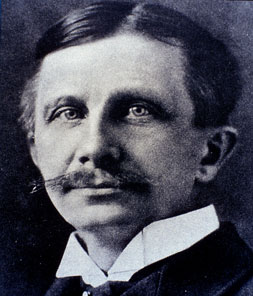January 7, 1851: It's your day, Bernhard Fernow!

Bernhard Fernow (FHS Archives)
Happy birthday, Bernie! You helped bring forest management and forestry education to the United States and Canada, and we are forever grateful! Have an extra piece of cake on us!
Born in Prussia on January 7, 1851, Bernhard Eduard Fernow trained for both law and forestry. He served in the Prussian Forest Service for seven years and completed his doctorate in forestry at the Forest Academy at Muenden. But instead of taking over a family estate as expected, he traveled to the United States in 1876 to attend the American Forestry Association (AFA) meeting held in Philadelphia and to be reunited with his American-born fiancée. They married soon thereafter and he became a United States citizen.
The first professionally trained forester in the United States, Fernow is a pivotal figure in forest and conservation history. For twelve years (1886–1898), he served as chief of the U.S. Division of Forestry, the predecessor to the U.S. Forest Service. He churned out top-notch reports, worked with legislators to pass the Forest Reserve Act (1891) and the Forest Management Act (1897), and put the lowly agency on a solid scientific footing. His work as the executive secretary of AFA (1883–1895) proved just as vital, moving that organization beyond its initial focus on planting trees to advocating for forest conservation and scientific management.

Left to right: R.H. Campbell, Walter Potts, Mrs. Fernow, and Dr. Fernow on Bow River Forest, Alberta, 1915 (FHS Archives).
Fernow should be considered the father of professional forestry education in North America. A long-time advocate for forestry schools in the U.S., in 1898 he left the U.S. Division of Forestry to establish the New York State College of Forestry at Cornell University, the first forestry school in the United States to offer a college degree. While there, he launched what would become the Journal of Forestry, the first professional forestry journal in the country. The governor shut the school down in 1903 after complaints from the wealthy neighbors of the school's Adirondack experimental forest. It seems they could hear the sawmill running and didn't want to be disturbed. In 1907, he founded the forestry program at Pennsylvania State College's main campus, teaching forestry there in the spring of 1907 before heading to the University of Toronto and establishing Canada's first forestry school, where he stayed until his retirement in 1920.
Moreover, Fernow represents the transition in forest conservation thinking from the post–Civil War conservationists to the Progressive conservationists, a transition from self-taught botanists and scientists to professionally trained foresters. He provided the first link from forestry’s German roots to its transplantation to the New World. Sympathetic to the moral arguments being made about preserving forests, he knew that conservation was really about economics and that forestry was about annual profits. He worked for the establishment of American forestry management with a singular purpose, but ultimately left to teach in Canada with his reputation in tatters and his endeavors largely unappreciated. He was widely praised after his death in 1923, but then began receding in historical relevance.
That he has received so little recognition for his role in organizing and fostering the forestry profession in America speaks more to the efforts of his professional rivals (especially but not exclusively Gifford Pinchot) to elevate their own work at the expense of his than it does to his actual contributions. The one full-length biography of him, Bernhard Eduard Fernow: A Story of North American Forestry, does little to help recover his reputation because of its dated interpretations (it was originally published in 1951) and poor organization. (A bit encyclopedic, it is, however, an excellent resource for understanding the beginnings of forestry in the western hemisphere.)

Left to right: USFS Chiefs John McGuire, R. Max Peterson, and F. Dale Robertson at the book signing party for the 1991 reprint of the Fernow biography (FHS Archives).
It’s time now for a new biography of Fernow—one that incorporates the historiography of the last half-century and can also properly assess his legacy now that so much has been written about the agency he helped to get up and running. That would be a worthy birthday gift!
For more information see the Bernhard E. Fernow page in the FHS U.S. Forest Service Headquarters History Collection.

